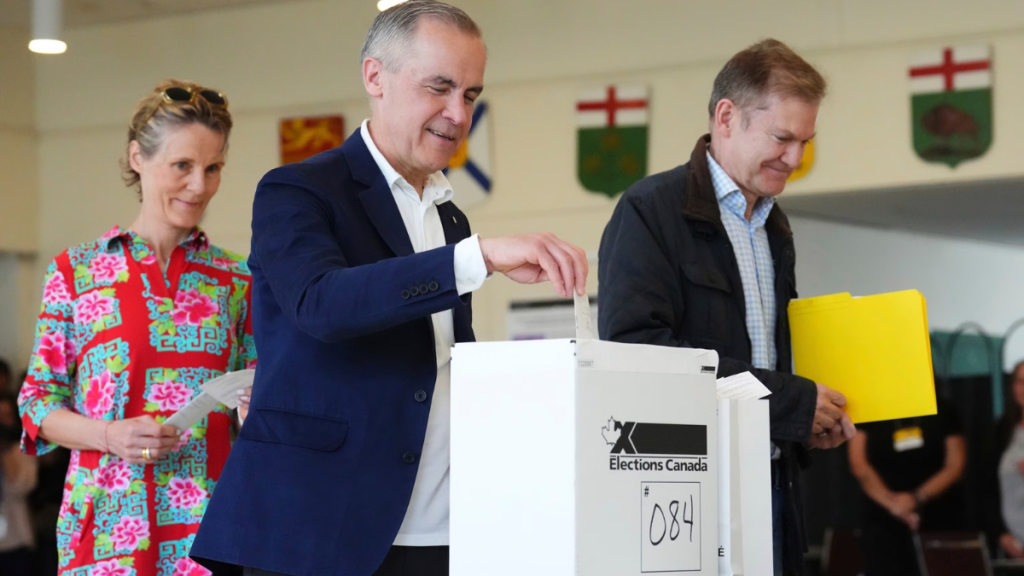Mark Carney, the former central banker and prominent Liberal figure, is now poised to take the reins as Canada’s next prime minister. This development comes at a pivotal moment in the 2025 federal election, marked by an unexpected and controversial statement from former U.S. President Donald Trump, who suggested Canada should become America’s 51st state.
What was once a commanding Conservative lead under Pierre Poilievre has narrowed sharply, with Carney making significant gains in key provinces. According to political analysts, the shift has been largely driven by Canadian backlash to Trump’s perceived interference in Canadian politics.
Carney, representing a moderate liberal platform, has seized the moment to rally voters around national sovereignty, foreign policy independence, and a return to centrist values.
His campaign also benefits from a rejection of Trump-style populism, which some Canadians see mirrored in Poilievre’s policies. The Liberal Party’s strategy of appealing to undecided voters and centrists appears to be paying off, as polling shows a surge in support for Carney just days before the election.
Trump’s ’51st State’ Remark Backfires in Canada
Trump’s controversial comments, shared via his Truth Social platform on Canada’s election day, called for Canada to consider becoming the 51st U.S. state. The message, though likely meant to provoke, sent shockwaves across Canadian media and political circles.
It ignited strong reactions from leaders across party lines, who denounced the statement as both disrespectful and a threat to Canadian sovereignty.
The remark seems to have had an unintended consequence: uniting Canadian voters across the political spectrum. Rather than diminishing support for Liberal candidates, it galvanized the electorate around national identity, triggering a last-minute surge for Carney’s campaign.
Political commentators say the incident likely “turned the tide” in an otherwise stagnant race.
Adding fuel to the fire, U.S. Senator Marco Rubio seemed to echo Trump’s sentiment during a press conference, suggesting the U.S. might “one day need to secure its northern border more directly.”
These comments were quickly condemned by Canadian officials and sparked concern about the future of U.S.-Canada relations.
Carney’s Campaign Capitalizes on National Sentiment
Mark Carney’s campaign has skillfully shifted its message to emphasize Canadian pride, self-determination, and resistance to foreign pressure.
Campaign speeches over the past week have highlighted the dangers of populist alignment with U.S. right-wing politics, subtly drawing distinctions between his Liberal platform and Poilievre’s perceived embrace of American conservatism.
Carney, who has never held elected office before, brings with him a reputation for competence, international credibility, and economic expertise.
These qualities are proving attractive to voters seeking stability and global cooperation, especially amid economic uncertainty and rising concerns about Canadian autonomy.
While Carney’s message resonates most in urban and suburban areas, analysts say even traditionally Conservative rural regions are seeing small but noticeable shifts in Liberal support. Should the trend continue through election day, Carney may lead the Liberals to either a strong minority or narrow majority.
Election Projections Show Carney Leading
As of the latest projections, Carney’s Liberal Party is forecast to secure approximately 162 seats, just shy of the 172 needed for a majority in Canada’s House of Commons.
The Bloc Québécois is expected to maintain a strong showing in Quebec, while the New Democratic Party (NDP) and the Greens may lose ground in favor of strategic Liberal voting.
In contrast, the Conservatives under Poilievre, despite a historically strong vote share, may find themselves isolated politically, with fewer paths to form a coalition. Critics argue that Poilievre’s close ideological ties to Trumpism alienated centrist voters and undermined his broader appeal.
With voter turnout on the rise and national pride emerging as a central issue, this election could redefine Canada’s political landscape for years to come.

Looking Ahead: A New Era for Canada?
If elected, Carney is expected to focus on uniting Canadians and restoring Canada’s role on the global stage. Key issues on his platform include eliminating the federal carbon tax introduced by Trudeau, fostering economic growth through sustainable investment, and reinforcing democratic institutions in the face of rising global authoritarianism.
Carney has also expressed interest in rebuilding Canada’s relationship with the United States—though with a renewed emphasis on equality and mutual respect, in contrast to Trump’s antagonistic posture.
Regardless of the final result, this election underscores a deep public desire to affirm Canadian identity and protect national institutions from outside influence.
As voters head to the polls, the world watches closely to see how Canada will define itself in an increasingly polarized global political climate.
For in-depth analysis and real-time election coverage, visit The Guardian’s Canadian election hub.
Disclaimer – Our team has carefully fact-checked this article to make sure it’s accurate and free from any misinformation. We’re dedicated to keeping our content honest and reliable for our readers.
